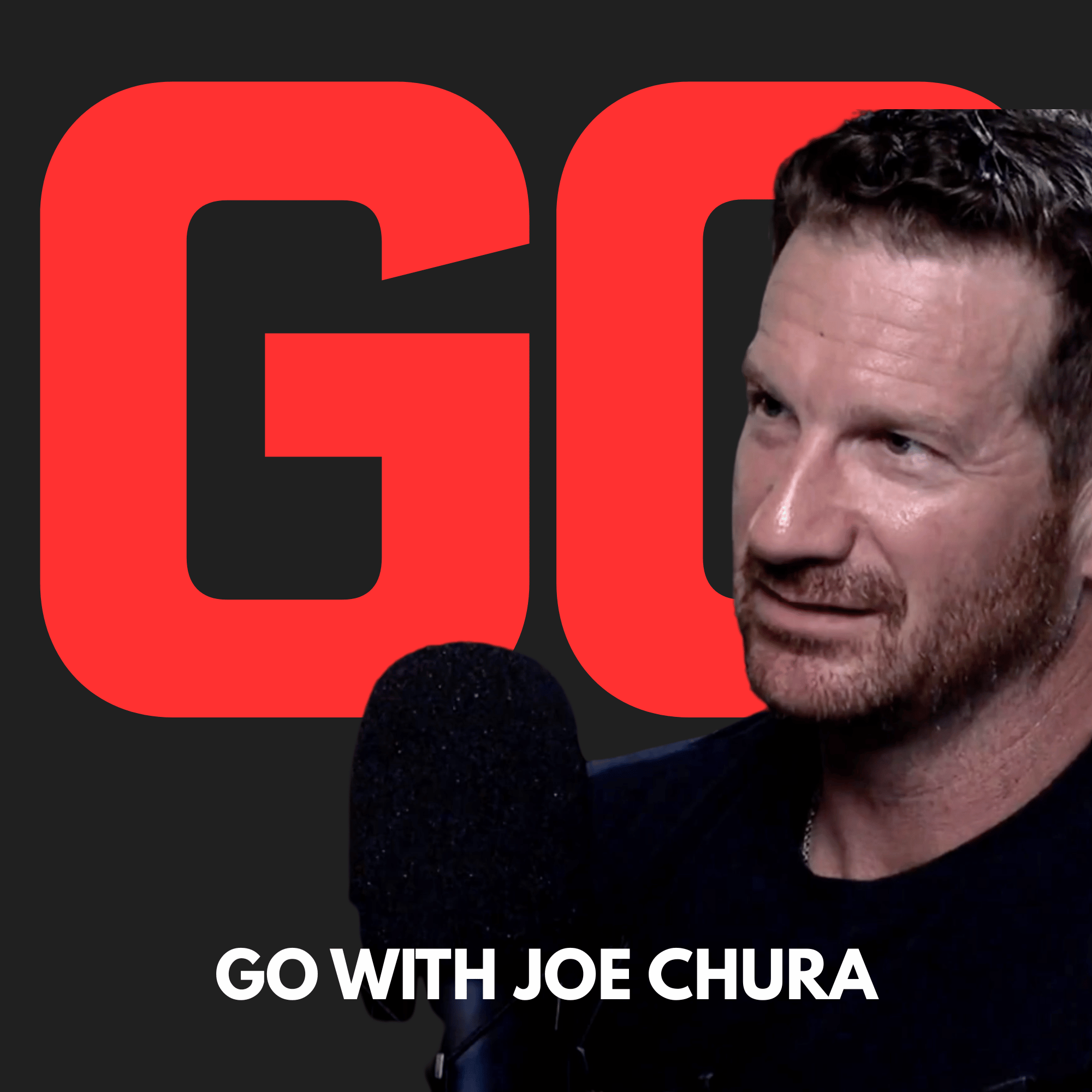
24.2K
Downloads
84
Episodes
2015 Chicago Marathon. Mile 13. I’m flying—feeling like I could run forever. Heart surgery, back surgery, barely able to stand a decade before, and here I am crushing it. Then I see the sign: NOT ALMOST THERE. Everything changed. Heavy legs. Cramping. Mental breakdown. I barely finished what started as my best race ever. That sign broke me, but it also built me. Southside Chicago kid who studied for 15 seconds between building cars on the assembly line. Graduated in 5 years. Built companies. Sold two. 800 employees. Young father at 20 who figured it out as I went. I’ve spent 50+ episodes of Not Almost There interviewing experts, and now my cohost and I are diving deeper into the conversations that matter most. We dig into what it really takes—in business, branding, health, life. No fluff. Real talk about building something that matters while the clock’s ticking. Whether you’re running your first mile or your hundredth company, we’re here to help you go the distance. Because almost there isn’t good enough.
Episodes
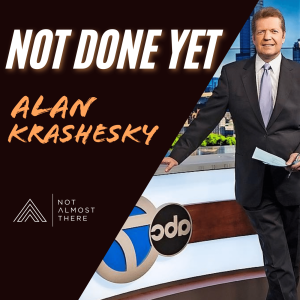
Tuesday Feb 01, 2022
Not Done Yet with Emmy Award Winner Alan Krashesky
Tuesday Feb 01, 2022
Tuesday Feb 01, 2022
Alan Krashesky is an Emmy award-winning broadcast journalist. As ABC 7's primary news anchor, he currently co-anchors three of ABC 7's top-rated weekday newscasts at 5 p.m., 6 p.m., and 10 p.m. Among Chicago's most trusted news anchors, Krashesky is well-known and respected for both his news anchoring and news reporting. Every newscast he has anchored has consistently been rated No. 1 in the Chicago market. He joined ABC 7 as a general assignment reporter in 1982. Krashesky's reporting in Chicago and abroad has earned high praise. He has earned numerous Chicago Midwest Emmy Awards and a Chicago Headline Club Peter Lisagor Award. He is considered one of the top reporters in the market to cover major domestic and international stories. He gained his first broadcasting experience in college when he was a news anchor on WICB-FM radio in Ithaca, New York. In addition to his career accomplishments, Krashesky has a long and outstanding history of volunteering his personal time for community service. He serves as a mentor for students interested in broadcast journalism and is a local spokesperson for Alzheimer's disease. He is also a member of the Chicago Midwest Chapter of the National Academy of Television Arts and Sciences and the Society of Professional Journalists. Krashesky was born in Philadelphia, Pennsylvania, but attended the Milton Hershey School in Hershey, Pennsylvania, a residential school for children with financial and social needs.
IN THIS EPISODE…Joe and Alan talk about his impressive career, Alan has been a news anchor for almost 40 years. While the news, its content, and digging into the idea of truth in media is a part of the conversation, Alan’s personal story is also incredibly important. Alan talks about his upbringing and how a horrible tragedy led to a life path, while may seem unorthodox, ultimately gave him the stability he needed to become the successful person he is today. Alan advocates for forward progress over perfection. Goals are important, but things can happen along the way that can take you down a different path.
🔍 Breakdown with Alan Krashesky:
Chapter 1 (0:00): Introduction
Joe introduces Alan and sets up the episode.
Chapter 2 (2:00) Alan’s early life
Alan’s father was taken from him too soon. His mother could not handle taking care of her children alone, so Alan was sent to an all boys school
Chapter 3 (22:29) Letter to his wife
While a young man, Alan met his now wife at a time where there was no social media and they corresponded with hand written letters.
Chapter 4 (24:36) Decisions pave the way
You often cannot connect the dots by looking forward, only by looking back. You may not know why an event is happening in your life until it has passed you.
Chapter 5 (33:55) Crime and media coverage
Alan was a victim of a terrible crime and therefore is able to bring his empathy and compassion to the stories he tells.
Chapter 6 (60:12) How to process live information
Being on air and gettinig information live can be stressful, but Alan explains how he is able to manage and recover from any mistakes.
Chapter 7 (65:41) Leadership and finding the we vs me
You are only as good as the team around you. Make sure you are finding the right people to surround yourself with.
Chapter 8 (65:41) Finding truth in the news
The most important point to keep in mind, is your source of truth. Also you need to keep in mind affiliations surrounding your media.
Chapter 9 (70:52) Critics of the world
Developing thick skin is important and to learn the importance of not giving attention to negativity.
Chapter 10 (77:59) Closing Remarks
Joe wraps up the episode and shares his final thoughts
Material Referenced in this interview:
→Channel 7 News
→https://www.mhskids.org/
📞 Connect with Alan Krashesky
→https://www.instagram.com/alan_krashesky
→https://www.facebook.com/krashesky
→https://www.linkedin.com/in/alan-krashesky-4714368
→https://twitter.com/KrasheskyABC7
👊 To learn more about Not Almost There by visiting this link
→ Not Almost There http://notalmostthere.com
Connect with Joe on social here:
→https://www.instagram.com/notalmostthere
→Facebook https://www.facebook.com/notalmostthere
→Twitter http://twitter.com/joechura
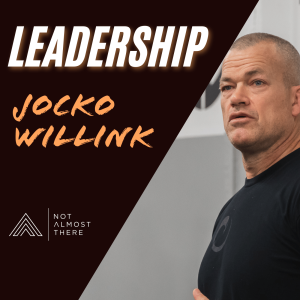
Sunday Jan 16, 2022
Leadership with Jocko Willink, Navy Seal Commander, Author and Entrepreneur
Sunday Jan 16, 2022
Sunday Jan 16, 2022
Jocko Willink is a retired U.S. Navy SEAL officer, co-author of the #1 New York Times bestseller Extreme Ownership, Dichotomy of Leadership, host of the top-rated Jocko Podcast, and co-founder of Echelon Front, where he serves as Chief Executive Officer, leadership instructor, speaker, and strategic advisor. Jocko spent 20 years in the SEAL Teams, starting as an enlisted SEAL and rising through the ranks to become a SEAL officer. Jocko returned from Iraq to serve as Officer-in-Charge of training for all West Coast SEAL Teams. There, he spearheaded the development of leadership training and personally instructed and mentored the next generation of SEAL leaders who have continued to perform with great success on the battlefield. Jocko is the recipient of the Silver Star, the Bronze Star, and numerous other personal and unit awards. Upon retiring from the Navy, Jocko co-founded Echelon Front, a premier leadership consulting company, where he teaches the leadership principles he learned on the battlefield to help others lead and win. Jocko also authored the Discipline Equals Freedom Field Manual, a New York Times Bestseller.
IN THIS EPISODE… Jocko and Joe talk about the origin of Jocko’s propensity for leadership. Jocko also talks about his time in the Navy Seals and how serving our country was a natural calling for him. He shares stories and insights he has learned from being in the Navy Seals for 20 years, and as an entrepreneur, including a story about how Jocko handles dealing with someone coming at you heated - his insight was spot on.
🔍 Breakdown with Jocko Willink:
Chapter 1 (0:00): Introduction
Joe introduces Jocko and sets up the episode.
Chapter 2 (2:00) Serving in the military
Serving for over 20 years is something that Jocko views as an honor. He felt he was always called to serve and was happy to do so.
Chapter 3 (8:12) Becoming an officer
Once Jocko became a leader within the seals, he shares his experience on how he was able to fill that role.
Chapter 4 (14:47) Leadership in business
Once Jocko was ending his career in the military he began a consultative career in leadership through the experience he gained while serving.
Chapter 5 (25:39) Themes from corporations
Even though you may imagine the corporate world to be different from the military, there are actually more similarities.
Chapter 6 (32:40) Finding Jiu-Jitsu
Jiu-Jitsu was a profound experience for Jocko. It was a practice that combined all the practices and lessons he had learned throughout his life.
Chapter 7 (42:47) Importance of breathing
Jocko didn’t have a major epiphany surrounding breathing, but he finds that not allowing panic to set in during a situation is what helps keep control.
Chapter 8 (49:08) Prioritize your day
Organizing your day is running an efficient team. Use the four laws of combat, cover, move, prioritize, decentralize command.
Chapter 9 (54:38) New products
Prioritize time for everything. Jocko needs to plan time to come up with new ideas and then allows his team to run with the plan.
Chapter 10 (58:33) Closing Remarks
Joe wraps up the episode and shares his final thoughts
Material Referenced in this interview:
→About Face by David H. Hackworth
→Breath by Rickson Gracie
→Extreme Ownership by Jocko Willink and Leif Babin
📞 Connect with Jocko Willink
→https://www.instagram.com/jockowillink/?hl=en
→https://www.facebook.com/jkowillink
→https://www.linkedin.com/in/jocko-willink-260b289
→https://echelonfront.com
👊 To learn more about Not Almost There by visiting this link
→ Not Almost There http://notalmostthere.com
Connect with Joe on social here:
→https://www.instagram.com/notalmostthere
→Facebook https://www.facebook.com/notalmostthere
→Twitter http://twitter.com/joechura
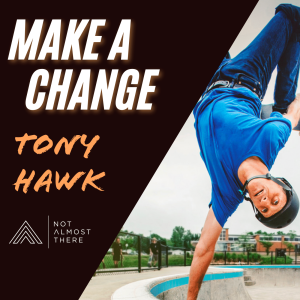
Friday Dec 31, 2021
Make a Change with the Legend Tony Hawk
Friday Dec 31, 2021
Friday Dec 31, 2021
Tony Hawk is a professional skateboarder and actor. He started at the age of nine when he got his older brother’s blue fiberglass skateboard. He used to practice at the now-defunct Oasis Skatepark at the age of 12, performing maneuvers well beyond his age. By the time he was 16 years old, he had become a professional skateboarder. With time, he was able to start his own skateboarding company called ‘BirdHouse,’ along with compatriot Per Welinder. He also initiated his own series of video games, 16 titles of which have been released since 1999. Through his own YouTube channel called Ride, he hosts various shows and has teamed up with several artists and musicians who have been inspired by skating. He has started the Tony Hawk Foundation for building skateparks for the underprivileged.
IN THIS EPISODE… Joe sets the story of his conversation with Tony and explains how he made a big mistake. From there the interview starts, and Tony Hawk shares with Joe some of his most memorable moments from movie sets, the pride of watching his daughter drop in for the first time, and the mentality we need to take while covid has made a major impact on us all.
🔍 Breakdown with Tony Hawk:
Chapter 1 (0:00): Introduction
Joe introduces Tony and sets up the episode.
Chapter 2 (): Lessons Learned
Lessons Joe learned throughout his first year podcasting
Chapter 3 (2:00): Learning an ollie
The conversation with Tony starts off with Joe talking about learning his first skateboard trick
Chapter 4 (5:43): Inventing new tricks
Inventing a new trick can be difficult and Tony explains his process
Chapter 5 (11:58): Daughters accomplishment
Tony’s daughter accomplished her first drop-in!
Chapter 6 (17:04): Being on movie sets
There have been several movie sets Tony has been a part of and he shares his experiences
Chapter 7 (22:13): What covid has taught Tony
The crazy pandemic has taught us all a mind shift, and Tony explains what it has taught him
Chapter 8 (25:53) Closing Remarks
Joe wraps up the episode and shares his final thoughts
Material Referenced in this interview:
→https://skatepark.org
→Daddy’s Home - Movie
→Gleaming the Cube - Movie
📞 Connect with Tony Hawk
→https://www.instagram.com/tonyhawk
→https://www.facebook.com/TonyHawk
→https://twitter.com/tonyhawk
→https://tonyhawk.com
👊 To learn more about Not Almost There by visiting this link
→ Not Almost There http://notalmostthere.com
Connect with Joe on social here:
→https://www.instagram.com/notalmostthere
→https://www.facebook.com/notalmostthere
→http://twitter.com/joechura

Wednesday Dec 22, 2021
I‘m Possible with Richard Antione White
Wednesday Dec 22, 2021
Wednesday Dec 22, 2021
Richard Antoine White is an author, inspirational speaker, and professional musician. He is currently the principal tubist of the Santa Fe Symphony and is in his 10th season as principal tubist of the New Mexico Philharmonic. He's also the first African American musician in the United States to earn a doctorate in tuba performance and is now a professor of tuba at the University of New Mexico. With over two decades of performing on the world’s classical music stages, tubist Richard White has matured into a musician known for his clear sound and stylistic flexibility. He began his tuba studies with Ed. Goldstein at age twelve at The Baltimore School for the Performing Arts, where he graduated with honors. He then went to the Peabody Conservatory of Music to study with David Fedderly (Principal Tubist, Baltimore Symphony) where he received his Bachelor’s degree. On the advice of Mr. Fedderly, Richard traveled to Indiana University to study with the legendary Professor Daniel Perantoni. He continued his studies there receiving both his Master’s and Doctoral degrees.
IN THIS EPISODE…Dr. White shares his incredible life journey from being homeless with his mother on the streets of Baltimore to being the principal tubist of the Santa Fe Symphony and principal tubist of the New Mexico Philharmonic. As you can imagine there is a remarkable amount of life experience and lessons learned, and community found from his beginning to where he is now, and that journey is what RAW Tuba shares today. He isn’t done with his goals yet, he also shares a big new way to give back through the RAW Tuba Ranch.
🔍 Breakdown with Dr. Richard Antione White:
Chapter 1 (0:00): Introduction
Joe introduces Richard and sets up the episode.
Chapter 2 (2:00) Richard’s beginning
Richard and his mother were homeless on the streets of Baltimore. He had a rough start in life and was a small child primarily on his own.
Chapter 3 (7:05) Being taken away
During the blizzard of 1978 Richard couldn’t find his mother, so he curled up in a building vestibule. He was found and it was decided that his mother was unfit for his care.
Chapter 4 (12:51) Starting school
After being taken in by his grandparents, they quickly realized he had not had any schooling. They got him enrolled and it was a major adjustment.
Chapter 5 (16:02) Finding music
With his stature, Richard tried to go out for sports but quickly realized music is what fueled him the most.
Chapter 6 (21:22) Auditioning for new school
Quickly Richard and his parents could see he was outgrowing the public school he was at, so they arranged for him to audition for the Baltimore School of the Arts.
Chapter 7 (29:38) work ethic and practice
There is no cheating hard work and practice. Richard makes sure to prioritize practicing and scheduling workouts to keep up his abilities.
Chapter 8 (34:24) Connecting with his brother
His mom had one more son, and although they were estranged for the first decade of their lives, they found each other and bonded over their shared love of music.
Chapter 9 (38:38) Finding his father
Richard’s dad was in jail from the moment he was born. One day at one of Richard’s performances a man in the audience stood up and introduced himself.
Chapter 10 (44:33) Doctorate
He almost wasn’t able to get his doctorate with all the time in between professional musician jobs.
Chapter 11 (48:02) Writing I’m Possible
After watching the documentary that was created Richard knew he had to write his story and get it on paper.
Chapter 12 (55:06) Closing Remarks
Joe wraps up the episode and shares his final thoughts
Material Referenced in this interview:
→I’m Possible by Richard Antione White
→The Wire - HBO TV
→Whiplash - Movie
📞 Connect with Richard Antione White
→https://www.instagram.com/raw_tuba
→https://www.facebook.com/RAWTUBA
→https://www.linkedin.com/in/richard-white-15a054214
→https://rawtuba.com
👊 To learn more about Not Almost There by visiting this link
→ Not Almost There http://notalmostthere.com
Connect with Joe on social here:
→https://www.instagram.com/notalmostthere
→Facebook https://www.facebook.com/notalmostthere
→Twitter http://twitter.com/joechura
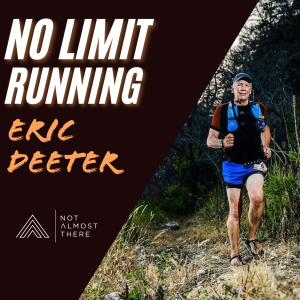
Sunday Dec 12, 2021
No Limit Running with Eric Deeter
Sunday Dec 12, 2021
Sunday Dec 12, 2021
Eric Deeter is an ultramarathon runner, podcaster, Mindset coach, and an advocate for running barefoot. Eric Deeter didn’t set out to run ultramarathons. He was trying to break out of the limiting beliefs that had limited his success for decades. He’d read all the self-help books. Attended mastermind seminars. Written and recited positive affirmations, but nothing worked. Then, in 2017, he learned a simple meditation that helped him unwind the stories of false humility lodged in his subconscious. He achieved his weight-loss goal that had eluded him for 15 years all through ChiRunning. The next day he ran his first mile on the trails, and never looked back. He went on to complete a 50-mile race, and after a failed attempt, complete his first of many 100 mile runs. Eric works with his clients as a ChiRunning instructor to help them develop the mindset to change their stories and self-talk so they can do more and go farther than they ever imagined.
IN THIS EPISODE… In today’s episode, Joe and Eric dive into how he got into Ultra Marathons because let’s face it, it is a unique individual that decides they are going to run a 100-mile race. That is exactly what makes Eric an incredible mindset coach and led him to explore different types of running philosophies. You need to listen to this episode to learn about two incredible running techniques that could be game-changers taking you to the next level of your own running goals. The most important part of their conversation is an incredible mindset tip Eric shares when Joe when he is asked about mentally preparing for a 100-mile race. This mindset share is not only good for race training but something you need to incorporate in your everyday life and personal goals as well!
🔍 Breakdown with Eric Deeter:
Chapter 1 (0:00): Introduction
Joe introduces Eric and sets up the episode.
Chapter 2 (2:00) Getting into ultra running
Eric decided to challenge himself when he saw a friend of his complete an incredible 50-mile race. I wanted to see what his limits were, and how hard he could push himself.
Chapter 3 (11:19) Progressing as a runner
Starting off just one mile at a time, Eric got on the trails near his house and focused on getting out every day and staying consistent.
Chapter 4 (17:46) Approaching a long distance
An important long-distance run lesson and life lesson is to take each run and race one small point at a time. Eric’s focal point was the check stations every 6 miles.
Chapter 5 (23:03) ChiRunning and how it helps
Eric is a certified ChiRunning instructor and by honing his Chi skills he has taken his running game to another level.
Chapter 6 (25:38) Running barefoot
Barefoot running is another tool Eric uses for his long-distance runs. Barefoot doesn’t necessarily mean the total absence of footwear, but an extremely thing sole to help feel the earth.
Chapter 7 (28:30) What running teaches you
Mental health is so important, and by running and taking limiting thoughts out of your mind, you can develop a new sense of confidence.
Chapter 8 (29:33) Breathing and its importance
Breath is one of, if not the most important tool while running. Working on your breath work is something that will pay itself back in dividends.
Chapter 9 (32:58) The samurai mentality
Tackling the code of running can be compared to a samurai. There is a code on honor that comes with completing the seemingly impossible task.
Chapter 10 (45:28) Closing Remarks
Joe wraps up the episode and shares his final thoughts
Material Referenced in this interview:
→https://ericdeeter.com
→https://ericdeeter.com/learn-chirunning
📞 Connect with Eric Deeter
→https://www.facebook.com/edeeter
→https://www.instagram.com/ultramindsetpodcast
→https://www.instagram.com/ericdeeter
→https://www.linkedin.com/in/eric-deeter
👊 To learn more about Not Almost There by visiting this link
→ Not Almost There http://notalmostthere.com
Connect with Joe on social here:
→https://www.instagram.com/notalmostthere
→Facebook https://www.facebook.com/notalmostthere
→Twitter http://twitter.com/joechura
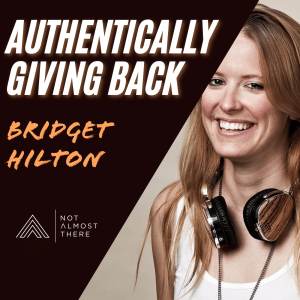
Sunday Dec 05, 2021
Authentically Giving Back with Bridget Hilton
Sunday Dec 05, 2021
Sunday Dec 05, 2021
Bridget Hilton is an entrepreneur, philanthropist, and inspirational speaker. With 20 years of experience as a designer and marketer, Bridget has built 8-figure businesses while traveling the world giving back. She is passionate about sharing her experiences and inspiring others to live a more fulfilling life. She co-founded her company LSTN in 2012 to create the world's first inspirational electronics company which has helped more than 50,000 people receive hearing aids through their proceeds. Her efforts have been featured on Good Morning America, Today Show, and the New York Times. Most recently she is developing a new company called, Experiential Billionaire where she is focused to help shift people’s focus away from acquiring things to acquiring experiences. Bridget is on a mission to help others invest in experiences, expand their time and die with no regrets.
IN THIS EPISODE… In today’s episode, Bridget and Joe talk about founding her company, why her mission of philanthropy was so important, and how she was able to break through such a crowded space with LSTN, which includes a special partnership with Tim Ferris and Delta Airlines, which are two incredible opportunities! They also discuss how 2020 made a profound impact not only on her business but on her mental health, which led Bridget to start a new company, experiential billionaire. It is an incredible idea, where she is focused to help shift focus away from acquiring things to acquiring experiences.
🔍 Breakdown with Bridget Hilton:
Chapter 1 (0:00): Introduction
Joe introduces Bridget and sets up the episode.
Chapter 2 (2:00) Getting into the audio space
Bridget had a profound experience watching a video of a girl hearing sound for the first time, and what happened next was incredible.
Chapter 3 (11:19) Designing a cool product
Breaking into the audio space is very difficult. Bridget knew she had to focus on the design to really set herself apart.
Chapter 4 (17:46) Encounter with a Lion
Bridget found herself face to face with a lioness. This could have been the end for Bridget, but she shared what happened.
Chapter 5 (23:03) Living intentionally
It is easy to get lost in the day-to-day. It is so important to make sure you are living a life of substance and purpose.
Chapter 6 (25:38) What has made an impact
Finding outlets to help focus on developing your best self is so important. Bridget shares what books and life events really made an impact.
Chapter 7 (28:30) transcendental meditation
Finding different exercises to help with mental health is so important. Transcendental medication really was a turning point.
Chapter 8 (29:33) LSTN helping others
LSTN gives back to 3rd world countries and gives hearing aids to those in need. They have been able to help over 50,000 people.
Chapter 9 (32:58) Developing experiential billionaire
Being surrounded by too many things makes your life go by so much faster. Slow things down and make memories by investing in experiences.
Chapter 10 (45:28) Closing Remarks
Joe wraps up the episode and shares his final thoughts
Material Referenced in this interview:
→https://lstnsound.com/
→https://lstnsound.com/pages/giving-back
📞 Connect with Bridget Hilton
→hhttps://www.instagram.com/bridgetlhilton
→https://www.facebook.com/LSTNheadphones
→https://twitter.com/bridgethilton
→https://www.linkedin.com/in/bridgethilton/
👊 To learn more about Not Almost There by visiting this link
→ Not Almost There http://notalmostthere.com
Connect with Joe on social here:
→https://www.instagram.com/notalmostthere
→Facebook https://www.facebook.com/notalmostthere
→Twitter http://twitter.com/joechura
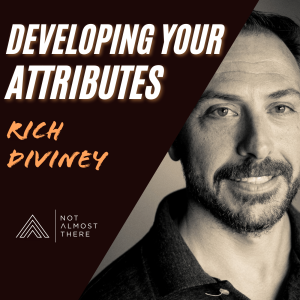
Sunday Nov 28, 2021
Developing Your Attributes with Navy Seal Commander Rich Diviney
Sunday Nov 28, 2021
Sunday Nov 28, 2021
Rich Diviney is a former Navy SEAL Commander, best-selling author, and a widely sought-after speaker and consultant. Rich served over 21 years with 13 overseas deployments, 11 of which were to Iraq and Afghanistan. Throughout his career, he has achieved multiple leadership positions, including the Commanding Officer of a Navy SEAL Command. Rich was also involved in a specialized SEAL selection process, which whittled a group of hundreds of extraordinary SpecOps candidates down to a handful of the most elite performers. He began to see that surprising core attributes—including cunning, adaptability, courage, even narcissism— determine how resilient or tenacious we are. This epiphany evolved into a SpecOps training program called MindGym—the first of its kind scientifically devised to help elite soldiers perform faster, longer, and better in all environments—especially high-stress ones. He also wrote a book, The Attributes, which focuses on the qualities needed to be elite. Diviney currently works as a speaker, facilitator, and consultant with the Chapman & Co. Leadership Institute and Simon Sinek Inc. He’s taught leadership and optimal performance to more than five thousand business, athletic, and military leaders from organizations such as American Airlines, Meijer Inc., the San Francisco 49ers, Pegasystems, Zoom, and Deloitte.
IN THIS EPISODE… Joe sits down with Rich in his home to talk about his book, The Attributes, his experience on the Navy Seals, and his incredible mindset and focus which really translates to being the ultimate leader. Understanding these qualities not only promotes greater self-awareness but also provides an outline to train for optimal performance in any situation—from parenting and sports to business and relationships. Joe and Rich also break down the difference between a skill and an attribute, how to develop and apply them to your everyday life. If you are looking to hire the right people or get hired yourself Rich shares incredible insight on your ideal job interview.
🔍 Breakdown with Rich Diviney:
Chapter 1 (0:00): Introduction
Joe introduces Rich and sets up the episode.
Chapter 2 (2:00) Experience in the Navy Seals
Rich shares what it was like being in the Navy Seals and ultimately how it lead him to uncover the attributes he writes about.
Chapter 3 (20:23) Grit and steadfastness as cornerstones
Out of the attributes Rich discusses grit and being steady are crucial. You need to ensure you are solid in order to build upon your foundation.
Chapter 4 (32:05) Social Media blackhole
It is easy to slip into narcissistic tendencies if you put too much emphasis on social media. It is so important to make sure you surround yourself with grounded people.
Chapter 5 (41:19) Paradox of low self-discipline and success
It inevitably happens that you find yourself as a high performer in your work or other areas, but a low performer when it comes to your personal goals.
Chapter 6 (29:38) The ability to multi-task
Striking a balance can be tough between doing your tasks to your full ability. Spreading yourself too thin makes for poor outcomes.
Chapter 7 (52:23) Leading with empathy and humor
Finding humor in even the hardest of situations can be a sign of a great leader. Humor along with empathy is what will set you apart.
Chapter 8 (72:36) Improving your attributes
The more you focus and create a plan for developing your qualities the more you can be successful in improving your attributes. You want an even-level ability amongst them all.
Chapter 9 (82:54) Finding balance in celebration
Achievement and accomplishment deserve their time for you to celebrate. It is important to take in the highs and also find a balance to continue on with future goals.
Chapter 10 (89:27) reducing stress in your breath control
Breathing out CO2 is integral in reducing your stress and staying calm even in the most precarious situations.
Chapter 11 (97:10) The best interview strategy
The importance of getting the right people on your team, and putting your best foot forward cannot be underestimated.
Chapter 12 (104:33) Closing Remarks
Joe wraps up the episode and shares his final thoughts
Material Referenced in this interview:
→https://theattributes.com/
→The Attributes by Rich Diviney
📞 Connect with Rich Diviney
→https://www.instagram.com/rich_diviney
→https://www.facebook.com/RichDiviney
→https://twitter.com/RichDiviney
→https://www.linkedin.com/in/richdiviney/
👊 To learn more about Not Almost There by visiting this link
→ Not Almost There http://notalmostthere.com
Connect with Joe on social here:
→https://www.instagram.com/notalmostthere
→Facebook https://www.facebook.com/notalmostthere
→Twitter http://twitter.com/joechura
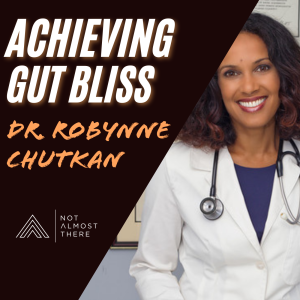
Sunday Nov 21, 2021
Achieving Gut Bliss with Dr. Robynne Chutkan
Sunday Nov 21, 2021
Sunday Nov 21, 2021
Dr. Robynne Chutkan is a gastroenterologist and the best-selling author of Gutbliss, The Microbiome Solution, and The Bloat Cure, and founded the Digestive Center for Wellness. Dr. Chutkan received her medical degree from Columbia College of Physicians and Surgeons in New York, where she also did her internship and residency and served as Chief Resident. She completed her fellowship in gastroenterology at Mount Sinai Hospital in New York and has been on the faculty at Georgetown University Hospital since 1997. She has been asked to serve as a medical consultant and on-air talent for the Discover Health Channel; she is a member of the medical advisory board for the Dr. Oz Show (where she has appeared as a regular guest); and has also made national appearances on The Today Show, The Morning Show, and The Doctors.
IN THIS EPISODE… Dr. Chutkan explains to Joe the importance of gut health, and they really dig deep into what that is, why it’s important, and most importantly, Robynne shares great actionable advice on what to avoid (spoiler alert - artificial sweeteners is big here so PUT DOWN THE DIET DRINK NOW), she also shares the best foods to keep your system happy and healthy, AND why the gut really is the true north star of your body by helping you stay healthy naturally during this constant covid battle and the dreaded flu season.
🔍 Breakdown with Dr. Robynne Chutkan:
Chapter 1 (0:00): Introduction
Joe introduces Robynne and sets up the episode.
Chapter 2 (2:00) Gut health what it is and why its important
Robynne shares why the gut is central to the body and so vitally important to your health and wellness. A lot of disease starts in the gut.
Chapter 3 (6:23) How Robynne chose her specialty
Gastroenterology is not a common area of expertise. Robynne shares how she started medical school and specifically got into her specialty.
Chapter 4 (13:13) Common gut mistakes
The gut is a commonly used work. There are a lot of assumptions people make, so Dr. Chutkan shares some common errors.
Chapter 5 (20:44) Checklist for your gut
Sometimes it’s good to remove everything to find that right or wrong something that is impacting your digestive health.
Chapter 6 (29:38) Problematic foods to avoid
There are so many foods that are high in chemicals that are negatively impacting your gut health. Also, just becuase something claims to be “DIET” doesn’t mean healthy.
Chapter 7 (38:53) First steps for your gut health
First things first, Robynne shares the place to get started for your gut health to ensure you are in the best shape possible.
Chapter 8 (47:41) The best fruits and vegetables
There are some fruits and vegetables that are higher in fiber and can pack a punch for your gut health.
Chapter 9 (55:11) Immune system in your gut
This is a rough time with vaccines and covid fear, but studies don’t lie; having a healthy gut superpowers your immune system.
Chapter 10 (64:17) Robynne giving back
The Digestive Center for Wellness has courses you can look through and free office hours. Go to the website and check it out
Chapter 11 (67:48) Closing Remarks
Joe wraps up the episode and shares his final thoughts
Material Referenced in this interview:
→https://gutbliss.com
→https://digestivecenterforwellness.com
→https://digestivecenterforwellness.com/courses
→Gutbliss by Dr. Robynne Chutkan
→The Microbiome Solution by Dr. Robynne Chutkan
📞 Connect with Robynne
→https://www.instagram.com/gutbliss
→https://www.facebook.com/drrobynnechutkan
→https://twitter.com/DrChutkan
👊 To learn more about Not Almost There by visiting this link
→ Not Almost There http://notalmostthere.com
Connect with Joe on social here:
→https://www.instagram.com/notalmostthere
→Facebook https://www.facebook.com/notalmostthere
→Twitter http://twitter.com/joechura
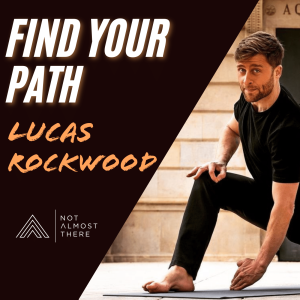
Sunday Nov 14, 2021
Find Your Path with Lucas Rockwood
Sunday Nov 14, 2021
Sunday Nov 14, 2021
Lucas Rockwood is the founder of Absolute Yoga Academy and Yogabody Fitness. With a formal yoga training background in Hot Yoga, Ashtanga Yoga, Gravity Yoga, and the Yoga Trapeze, Lucas has studied with some of the most well-respected teachers on the planet. Lucas founded Absolute Yoga Academy in 2006, one of the top 10 yoga teacher training schools in the world with 2,000 certified teachers (and counting) and courses in Thailand, Holland, the United Kingdom, and the Philippines. In 2013, Lucas founded Yogabody Fitness, a revolutionary new yoga studio business model that pays teachers a living wage and demystifies yoga by making the mind-body healing benefits of the practice accessible to everyone. He is also a highly acclaimed writer, radio show host, TV personality, business consultant, weight loss expert, and health coach.
IN THIS EPISODE...Lucas explains to Joe how he found himself in an unhealthy spiral in his early twenties and had a health scare most people don’t experience until late in life. Lucas and Joe talk about his ability to find new paths and how he has been able to keep himself open to all opportunities that came his way. Lucas radically changed his lifestyle after meeting someone shortly after his health scare who introduced him to yoga and good nutrition. He also talks about opening up a business in a different country and the stresses that come with it.
🔍 Breakdown with Lucas Rockwood:
Chapter 1 (0:00): Introduction
Joe introduces Lucas and sets up the episode.
Chapter 2 (2:09): Lucas’ back story
Lucas was in his early 20’s and found himself taking pills to normalize his energy level and stress levels. He didn’t realize how unhealthy he actually was until looking at an ID
Chapter 3 (8:49): Getting sober
When Lucas had to look at an ID badge for work he was embarrassed by the picture he saw that he kept it flipped around. He decided to stop the pills cold turkey.
Chapter 4 (13:16): Finding Yoga
As soon as he started yoga he started losing weight, he also quit smoking and started feeling so much better. The yoga community was so welcoming and encouraging.
Chapter 5 (17:20): Recovery and being healthy
Lucas was able to meet a couple that really inspired him and made him more interested in concentrating on healthy eating and spreading the word about yoga.
Chapter 6 (22:16): Falling off course
Alcohol was something Lucas struggled with at different points in his life, but the pivotal moment which made Lucas completely stop drinking was an interaction with his son.
Chapter 7 (26:21): Starting a business in Spain
Becoming an entrepreneur was something that happened to Lucas. It was a slippery slope of opportunity. Lucas took advantage of opportunities as they presented themselves
Chapter 8 (38:11): Difficulties of entrepreneurship
Starting your own business can often be glamorized, but the reality is that you have to worry about making ends meet for your family and employees.
Chapter 9 (46:08): Homelife now
Now Lucas is at home in Spain with his wife and kids. He has gone through periods of time trying other fitness avenues, but yoga is still his passion.
Chapter 10 (50:22): Closing Remarks
Joe wraps up the episode and shares his final thoughts
Material Referenced in this interview:
→https://www.yogabody.com/
→https://www.yogabody.com/about/
📞 Connect with Lucas
→https://www.instagram.com/lucasrockwood
→https://www.facebook.com/lucas.rockwood.yogabody
→https://twitter.com/LucasRockwood
→https://www.tiktok.com/@lucasrockwood?
👊 To learn more about Not Almost There by visiting this link
→ Not Almost There http://notalmostthere.com
Connect with Joe on social here:
→https://www.instagram.com/notalmostthere
→Facebook https://www.facebook.com/notalmostthere
→Twitter http://twitter.com/joechura
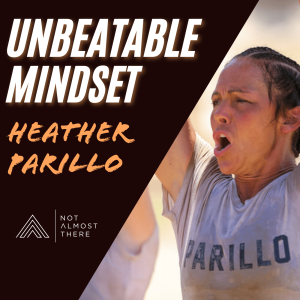
Saturday Nov 13, 2021
Unbeatable Mindset with Heather Parillo
Saturday Nov 13, 2021
Saturday Nov 13, 2021
Heather Parillo is the 20th woman in history to complete the Kokoro crucible; she is the CEO of IFLY Integrative Leadership and Unbeatable Mind Coach. Bringing more than 20 years of experience in the Service, Fitness, and Hospitality industries, she is a multifaceted visionary senior executive, integrator, coach, trainer, facilitator, relationship expert, and turnaround artist with a solid track record of leading individuals, teams, and companies to their stated goals. Heather held previous positions as Chief Experience Officer of The Live Well Brand, a vacation rental, concierge service, and lifestyle brand with headquarters in Florida. She is seasoned at leading transformation through a range of personal and business experiences as well as facilitating at the Middle East Leadership Academy (MELA) and Central Eurasia Leadership Academy (CELA), and Society Of International Fellows Leadership Academy (SIBFLA).
IN THIS EPISODE...Heather shares her story with Joe; how she found sealift and Unbeatable Mind, she read David Goggin’s book, “Can’t Hurt Me, and these were her lightbulb moments. Of course, she shares her experience training and preparing for Kokoro, and explains how she failed the first time she tried, what quitting meant to her, and through the process of having to tap out the first time, she was able to use that to fuel her to complete Kokoro during her second attempt. The most notable part of Heather’s story is how she started training - It is something that can’t be stressed enough - she found an unbelievable accountability partner and that can make ALL THE DIFFERENCE. Heather shares her experience and lessons that all stem from her incredible mental fortitude.
🔍 Breakdown with Heather Parillo:
Chapter 1 (0:00): Introduction
Joe introduces Heather and sets up the episode.
Chapter 2 (2:09): Heather’s Kokora experience
Kokora is a 50-hour seal team training simulation that is one of the hardest challenges in the world. Heather shares her experience and she signed up.
Chapter 3 (10:30): Reckoning with quitting
No one would call Heather a quitter when she couldn’t complete Kokoro on her first attempt, but that is what she called herself and what fueled her focus to prepare for attempt number 2.
Chapter 4 (16:25): Starting your journey with accountability
You just need to start. That’s number one. Sign up for a challenge or a race or some goal and just get yourself started. The next step is finding an accountability partner or community.
Chapter 5 (20:38): Attempting and crushing Kokoro for the 2nd time
There were many variables working against Heather during her first attempt at Kokora and that just made her train harder and be even more prepared for the second time around.
Chapter 6 (27:43): Finding inspiration with a positive and open mind
You need to keep an open mind about your potential and what is possible. Positivity follows activity, just like Rich Roll says, mood follows action.
Chapter 7 (37:57): Work-life balance
This word is used so much in our lives for a reason. It is easy to give ourselves to everyone else around you and forget about the importance of focusing on yourself.
Chapter 8 (42:05): Advice for training
Training doesn’t start out coming easy. It is something you need to start pushing yourself to do in order to develop a habit.
Chapter 9 (46:08): Breathing exercises
Breathing is crucial when accomplishing so many of our mental emotional and physical tasks. Its the most important aspect in even doing a pull up.
Chapter 10 (55:23): Just say yes
There are so many reasons your mind can come up with not to do something that can get in your way. Heather shares the positivity that will come when you open up to YES.
Chapter 11 (63:58): Closing Remarks
Joe wraps up the episode and shares his final thoughts
Material Referenced in this interview:
→https://sealfit.com/KOKORO/
→Can’t Hurt Me by David Goggins
→https://sealfit.com/
→Unbeatable Mind by Mark Divine
→https://unbeatablemind.com/
📞 Connect with Heather
→https://www.linkedin.com/in/heather-parillo-298b66113
→https://www.instagram.com/heather_parillo
→https://www.facebook.com/heatherparillocoach
→https://twitter.com/HeatherParillo
👊 To learn more about Not Almost There by visiting this link
→ Not Almost There http://notalmostthere.com
Connect with Joe on social here:
→https://www.instagram.com/notalmostthere
→Facebook https://www.facebook.com/notalmostthere
→Twitter http://twitter.com/joechura
